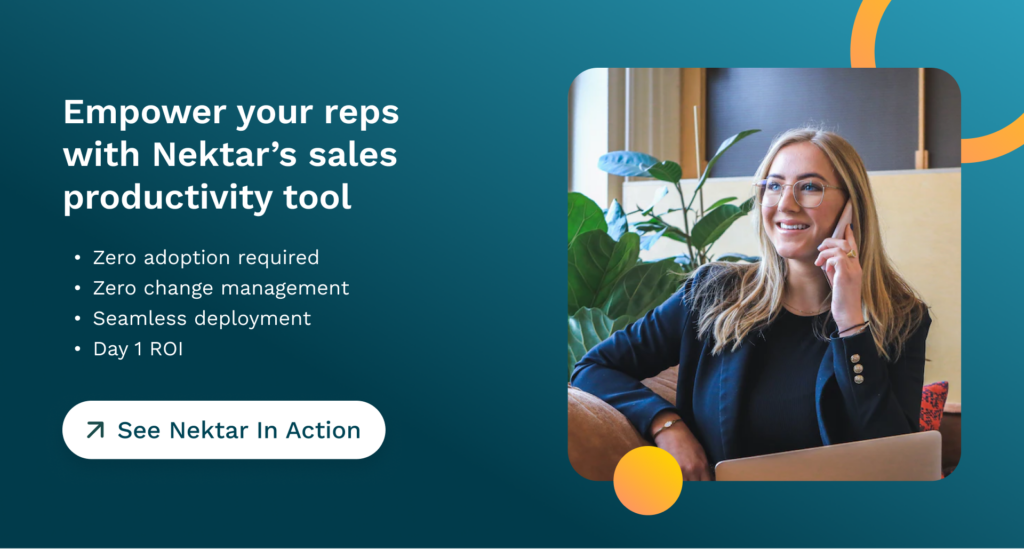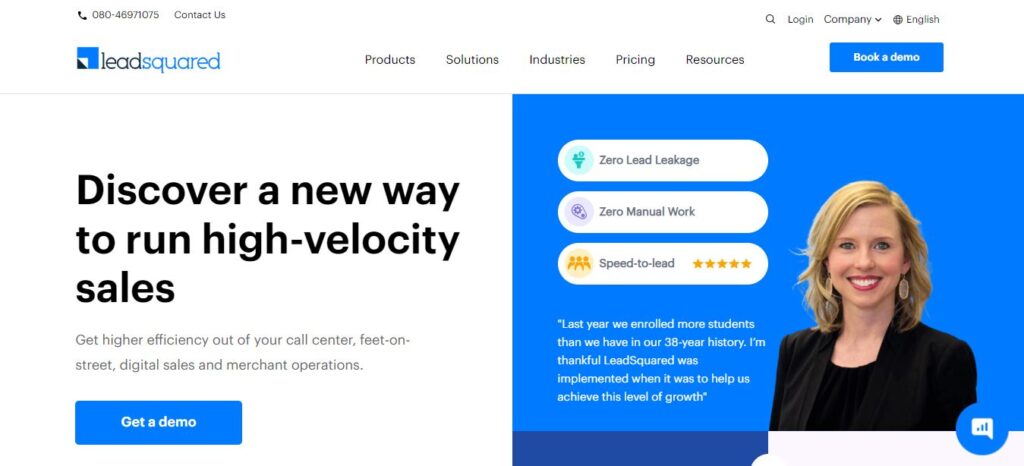Three.
That’s the number of sellers, out of 10, who expect to hit their full quota. And if that wasn’t difficult enough, as much as 69% of sales professionals agree that their job is more demanding now.
While reps grapple with the challenging selling situation, they must also adapt to an unpredictable economic environment — one that’s made their job highly competitive and resource-constrained.
When you face so many problems at once, productivity is bound to dive just as revenue leaks seep into the sales cycle.
That’s precisely why now is the right time to deploy sales productivity tools and empower your reps to:
- Rise to the challenge
- Build new skills
- Improve selling acumen, and
- Get comfortable with AI and data-driven selling.
In this blog, we discuss sales productivity, why it is vital for reps, and some of the best sales productivity tools you can deploy.

What is Sales Productivity?
Sales productivity measures how effective and efficient your sales teams are at generating revenue.
It aims to understand how to maximize results or output (such as revenue) from sales activities while simultaneously minimizing resources or inputs (such as time and cost) to achieve business goals.
As you can see above, sales productivity is made of two key elements:
- Efficiency = distribution and usage of resources
- Effectiveness = how resources achieve sales goals
Keeping a check on sales productivity helps you identify gaps in selling processes and figure out ways to improve.
Why Use Sales Productivity Tools in B2B Sales?
Sales productivity tools drive predictable revenue by motivating and supporting sellers. And happy reps equal a positive impact on the bottom line.
Here are 5 more reasons you should use sales productivity tools to support your reps.
1. Better Allocation of Time
B2B selling is more complex than ever before. Therefore, prioritizing high-value and high-impact activities is critical. Unfortunately, reps get caught up in non-selling tasks like CRM data entry.
The situation is dire today, with reps spending only 28% of their week selling, down from 34% in 2018.
On the contrary, reps are more productive when focused on performing core selling-related functions.
A significant number of reps (81%) feel that reducing their time on non-sales activities could be more profitable for their organization.
Sales productivity tools automate repetitive tasks, saving a ton of time for reps and letting them go full steam ahead with selling.
2. Making the Most of Activity Data
Revenue leaks arise from missing, inaccurate, or incomplete CRM data when reps have to enter this data manually.
Another scenario is when reps don’t know what information is necessary to close deals. They add too much information to the pipeline, making it bloated and extracting skewed insights.
A lack of complete pipeline visibility combined with ineffective sales processes may result in revenue leaks becoming a significant problem over time.
The problem is compounded, mainly when organizations use an average of 10 channels to sell to customers. That’s a lot of information coming in from multiple sources. And a rather tricky task for reps to keep up with.
Today, data quality is essential for building a solid RevOps foundation.
Raise the bar on data quality. It’s not good enough to have poor-quality data because ‘garbage in, garbage out.’ Your decisions will be a function of the clarity of your data.
Jeff Ignacio, Head of GTM Operations & Growth, regrow ag
Thankfully, technology automates data entry and integrates it from multiple customer touchpoints. You can ensure GTM alignment with unified data courtesy of sales productivity tools.
With unified data, reps have a clear and complete view of the pipeline, can pick the best opportunities, see the deal through and live up to customer expectations even after the deal is closed.
3. Quality Seller Engagement
Compared to 2020, 77% of sellers are working more hours in 2022. And as much as 69% of them are reeling from burnout.
To amplify the problem, 51% of reps are actively looking for new jobs for various reasons:
- Poor management
- Onboarding difficulties
- Low rep engagement
- Unfavorable compensation and benefits
Amidst it all, only 53% of sales leaders use coaching solutions.
Replacing reps in an uncertain business environment is challenging. For starters, recruiting costs are high. Moreover, it’s hard to replicate the buyer-seller camaraderie that a specific rep may have.
With sales productivity tools, you can provide reps with support for multiple tasks:
- Admin tasks
- Training
- Coaching
- Prospecting
- Multithreading, and more.
Sales productivity tools empower your managers to coach and guide reps with the right, actionable insights at their fingertips.
Effective coaching has considerable benefits on overall rep experience and, ultimately, on customer engagement.
B2B companies see a 1.8x improvement in customer KPIs by focusing on improving the employee experience.
4. Aligning Revenue Teams
Team alignment is pivotal to driving efficient and effective growth.
Marketing provides the right level of brand awareness and education. CS (customer success) needs to ensure they’re driving moments of delight for the customers and actively addressing issues. Product needs to make sure that they’re taking all the information they’re hearing from CS and the customers, continuing to innovate on the product, and ensuring that the feature sets are rich and competitive. All those things need to exist for sales to go and be successful, to drive a number. It’s a team sport.
cliff simon, cro at carabiner group
Yet, more than half of sales leaders (52%) say misaligned sales and marketing teams have cost them revenue. Another 36% feel that it prevents both teams from succeeding in achieving business goals.
It only means that the CRM alone can’t connect frontline teams with complete visibility into customers.
You need supporting tools that make RevOps easier for your teams – mainly when cross-functional alignment is sales leaders number 1 tactic for driving revenue growth.
Sales productivity tools ensure you can exchange information between teams seamlessly. Your teams get a shared data source and contact management for a connected customer experience.
Because when sales, marketing, and customer success are aligned, they know exactly what customers expect. They can use this knowledge to deliver the best buyer interaction every single time.
5. Keeping Up With the Market
87% of B2B buyers expect sales reps to act as trusted advisors.
But to become “trusted advisors,” reps must have clear visibility of their leads. Plus, they must know what your competitors are up to.
Reps must be quick, situationally aware, and adaptable to retain leads and provide the best customer experience to stay competitive.
Sales productivity tools provide competitive intelligence for reps. Using these insights, they can find practical and meaningful ways to respond to a dynamic selling environment and stay on top of the market.
If the reasons above have convinced you enough, we’ve listed this year’s best sales productivity tools for you to consider.
17 Sales Productivity Tools for 2023
Let’s dive right in.
1. Nektar
Nektar understands that increasing productivity per rep is essential. Therefore, its platform is geared towards scaling revenue-winning processes in sales teams.
You can stay on top of seller activities, guide reps with actionable insights and prioritize high-intent deals to maximize revenue and rep productivity.
Notable Features
- Automated CRM data entry with an intelligence layer
- Contextual contact data update
- Activity intelligence
- Deal health score
- Buyer and buying group intelligence
- Replicate winning sales behaviors
- Sales process adherence tracking
- Asynchronous, one-on-one coaching
- No-code platform
- Omnichannel integrations
Pricing
Nektar.ai offers customized packages for unique business needs.
2. Oracle AI for Sales
Oracle comes loaded with a suite of applications, Adaptive Intelligence for Sales, specifically built for sales teams.
The solution helps you effectively engage with and guide sales teams toward high-potential opportunities to improve win rates.
Notable Features
- Account planning and prioritization
- Account enrichment
- AI-enhanced lead scoring
- Lead activity effectiveness analysis
- Opportunity win probability
- Opportunity recommended actions
- Sales analytics
- Account engagement signals
- Integrations within the Oracle ecosystem
Pricing
Oracle provides custom packages based on your requirements.
3. Salesforce Sales Cloud Einstein
Salesforce’s Sales Cloud Einstein helps revenue leaders to make quicker decisions backed by AI.
It boosts productivity with data-driven selling processes and analytics.
Notable Features
- AI-driven insights on lead potential and opportunity health
- Einstein GPT
- Automated data entry
- Forecast signals
- Email, calendar, and Salesforce integration
- Sales analytics for historical data and business trends
Pricing
Sales Cloud Einstein offerings start from US$25 per user per month.
4. Leadsquared

LeadSquared is a one-stop CRM solution to improve sales and marketing workflows with automation. The tool is completely customizable, and its ability to integrate with third-party tools makes it a perfect fit for growing teams.
The CRM helps businesses improve sales productivity, manage their teams better, and transform sales outcomes.
Notable features
- Lead and contact management
- Workflow automation
- Sales intelligence
- Marketing automation
- Sales reporting and analytics
- Sales performance management
Pricing
LeadSquared’s Lite Plan, that covers all the essential features, starts at $25 per user/month.
5. Dooly
Dooly’s connected selling workspace makes it easy for revenue teams to share deal data to achieve revenue goals collaboratively.
The platform takes on activities that reps would otherwise put manual efforts into.
Notable Features
- Syncing meeting notes to Salesforce in real-time
- Add buying committee members to the CRM
- Centralized pipeline dashboard
- 1-click pipeline updates
- Pre-built sales templates
- Playbooks
- Integrations with multiple tools
Pricing
You can try out Dooly with limited features for free. Paid subscriptions start from US$ 30 per user.
6. Balto
Balto uses AI to improve buyer-seller interactions for better customer experience and increased revenue.
Its real-time enterprise solution prevents missed opportunities, compliance errors, and ineffective customer experiences.
Notable Features
- Real-time sales call guidance
- Real-time notetaker
- Smart checklists
- Dynamic selling prompts
- Gamification for reps: challenges, leaderboards, and badges
- Agent customization
- Call explorer
- Live listen, and agent chat for leaders or managers
Pricing
Pricing depends on your requirements for the number of seats, contract length, and products chosen.
7. Pitcher
Pitcher is a single yet multi-purpose sales enablement and customer engagement app.
It improves the effectiveness of your revenue processes, aligns teams, reduces the complexity of operations, and boosts customer impact.
Notable Features
- Built-in performance, analytics, and reporting module
- Full integration with CRM, business intelligence platforms, and customer touchpoints
- Content management
- Document automation
- Remote accessibility on mobile and offline
- Route planning optimization
- Pre-call and post-call planning
- Guided selling
- Order management
Pricing
You can request a demo and pick a personalized package for your business needs.
8. Proton
The unique aspect of Proton is that it’s built solely for distribution sales.
The platform is powered by AI, granting complete customer visibility so distributors capture high-potential opportunities and convert them into revenue.
Notable Features
- AI-generated Sales Plays
- Multichannel integrations
- Account prioritization
- Wallet share insights
- Product substitute finder
- Automated quote follow-ups
- Single-screen dashboard
Pricing
Proton provides custom pricing packages for distribution sales organizations.
9. Genesys
Genesys is a comprehensive customer experience platform. It helps reps to deliver AI-powered, personalized experiences to customers anywhere, anytime.
This sales productivity tool caters to all types of organizations, from small businesses to enterprises.
Notable Features
- Predictive routing
- Unified communication and collaboration
- Voicebots with natural language understanding (NLU)
- Chatbots
- Predictive engagement
- Knowledge management
- Agent assist
- Speech and text analytics
- Customer journey analytics
Pricing
Genesys’s subscription plans start from US$75 per month and move up to US$150 per month.
10. Humantic AI
Humantic AI shares buyer intelligence for revenue teams. It helps them identify the right opportunities and personalize outreach.
The platform provides insights into prospects’ preferences to build lasting customer relationships.
Notable Features
- Open AI for custom integrations
- Omnichannel enrichment
- Personality AI dashboard
- Personality AI assistant
- 1-click personalization
- Chrome extension
Pricing
Humantic AI has subscription plans for everyone, beginning from startups to enterprises. You can select one based on your requirements.
11. Hypertype
Hypertype is powered by AI to pick out information most relevant to a deal in real time.
Your reps can use the solution to find the best answers to buyer questions and create documents 10x faster.
Notable Features
- Powered by HyperbrainTM AI
- Trained to learn your industry during sign-up
- Chrome extension
- Match and fetch the best replies
- Knowledge and insights for the team
- Auto-detect FAQs outside the database
Pricing
Subscription plans for Hypertype start from US$4.99 per person per month.
12. Leadcamp
Leadcamp is an intent-driven sales engagement platform that captures buyer intent and uses it to automate prospecting at scale.
It equips sales teams with the means to achieve quotas by capturing lead information and assigning lead scores.
Notable Features
- Automated prospecting journey
- Multichannel email sequence builder
- Adapted sequences for intent
- Heat score
- Instant next-best-actions
- Reminders for at-risk prospects
- Coaching and management insights
Pricing
Leadcamp has three pricing packages, starting from €39 and going up to €99.
13. Seismic
Seismic empowers customer-facing revenue teams with insights, content, skills, and tools to win more deals.
It helps sales and revenue leaders fast-track sales cycles and decrease the time-to-close.
Notable Features
- 150+ integrations
- In-app search and in-context recommendations
- LiveDocs, LiveSocial, and LiveSend
- Sales content management and automation
- Learning and coaching via Lessonly
- Real-life scenario simulation
- Buyer engagement
Pricing
Seismic provides custom quotes tailored to your business needs.
14. Lyne.ai
Lyne lets sales professionals send personalized cold emails at scale. Moreover, it automates prospect research to speed up the sales cycle.
All you have to do is upload your list of prospects, and the platform can generate personalized additions for your cold emails.
Notable Features
- 9000% faster research than SDR or VA
- Up to 12 different personalization points
- Automated lead generation setup
- Easy workflows
- Lead scraping for LinkedIn
- Chrome extension
- Up to 2500 search results in 1 click
- Email validation
Pricing
Lyne.ai offers a free pricing plan with limited features, while custom packages start from US$120 per month.
15. Kalendar AI
Kalendar AI books new prospect meetings and generates revenue from potential customers from more than 340 million companies in just under 30 seconds.
The platform uses SalesGPT to find the right prospects for you.
Notable Features
- Customer match
- Auto-request meetings
- AI chat
- Inbound conversations
- Data sync and integrations
Pricing
Plans start from US$999 for 8-14 meetings after buyer conversations.
16. Salesken
Salesken champions and coaches reps with real-time sales conversation intelligence.
The solution helps your sales teams improve performance with cues during buyer conversations so that they may engage with customers better.
Notable Features
- One-click integration
- Real-time conversational assistance for reps
- Deal signals
- Pitch intelligence
- Customer intelligence
- Revenue intelligence
- Automatic scoring of calls
Pricing
Salesken’s pricing depends on your custom requirements.
17. Salesbox AI
Salesbox AI is geared towards sales teams using ABM strategies. It identifies, scores, and prioritizes first-party intent from anonymous website visits.
You can orchestrate one-on-one conversations with target groups, run AI-powered ANM ads, and measure campaign success.
Notable Features
- Sales GPT
- Key buyer contacts from over 100 million contacts
- Revenue Waterfall creation
- AI-powered assistants
- Up to 5 buyer personas
- 1st party intent from 600+ content hubs
- Retargeting and contextual ads
- Optimize ad spends
- Custom workflows and playbooks
Pricing
Salesbox AI offers customized pricing plans for your business needs.
All of the above tools can serve your business in their own ways. However, before going all out on making sales productivity tool purchases, ensure that they’re built for your reps first.
Drive Sales Productivity by Keeping Reps Central to Your Tech Stack
While building a sales productivity tool stack, consider your reps’ needs paramount. They’re using tools to build revenue for you, so each tool must solve their problems.
There are a lot of great salespeople out there. There are also a lot of great tools out there. So understanding whom those tools are designed to serve, they need to be at the center of the selection process.
caroline holt, vp of revenue training & enablement, bonterra
Deploy tools that improve the selling experience for reps with:
✓ Actionable pipeline visibility
✓ Complete contact data
✓ Unlocking hidden opportunities, and
✓ Zero pressure on rep adoption
And if you still need to figure out where to start looking for the one tool to get started with, reach out to our team at Nektar.







